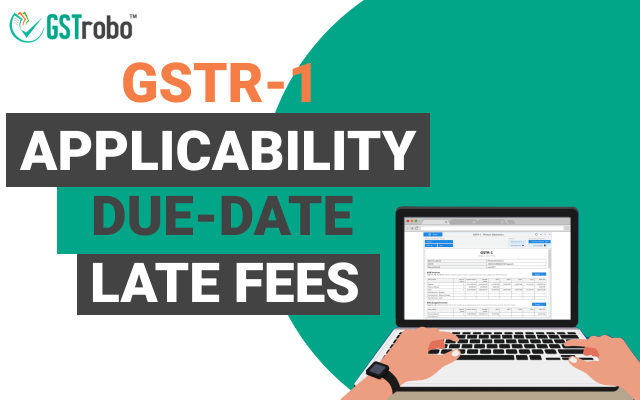GSTR-1 – Applicability, Due-Date, and Late Fees
GSTR-1 is a type of GST return that contains every detail regarding sales made by a taxpayer. In this blog, we will try to cover all the aspects related to GSTR-1.

What is GSTR-1?
GSTR-1 is a monthly/quarterly GST return that needs to be filed by every registered GST taxable person. GSTR-1 consists of all the information regarding sales made by such taxpayer in that particular taxable period.
Due-Date of GSTR-1
GSTR-1 due date depends on the aggregate turnover of the taxable registered person. A taxpayer whose aggregate turnover is up to INR 1.5 Crores can file GSTR-1 quarterly. However, such taxpayer needs to furnish inward supply details in IFF. On the contrary, a taxpayer who has an aggregate turnover of more than INR 1.5 Crores needs to mandatorily file GSTR-1 on or before the 11th of the subsequent month. For instance, for the month of April 2021, the taxpayer needs to file GSTR-1 on or before the 11th of May.
GSTR-1 Applicability
Here is the list of the taxable person who does not need to file GSTR-1.
- Composition Scheme Holders
- NRTP (Non-resident Taxable Person)
- ISD (Input Service Distributors)
- TCS collector
- TDS deductor
- OIDAR (Online Information and Database Access or Retrieval Services) provider
It shall be noted that other than the above taxpayer, every other registered taxable person needs to file GSTR-1 and Nil GSTR-1 in case if there is no transaction during the taxable period.
Revising GSTR-1
Once a taxpayer files a GSTR-1, he/she cannot revise it. Any mistake or error in GSTR-1 can be amended in the GSTR-1 of the next taxable period. For instance, if a taxpayer files GSTR-1 in the It means that if a mistake is made in GSTR-1 of December 2020, rectification for the same can be made in the GSTR-1 of January 2021.
GSTR-1 Late Fees
If a taxable registered person does not file GSTR-1, he/she needs to pay a late fee of INR 50 per day. However, in the case of nil GSTR-1, the taxpayer needs to INR 20 per day. It shall be noted that the GST officer can also raise a notice to pay late fees at the time of assessing the returns.
